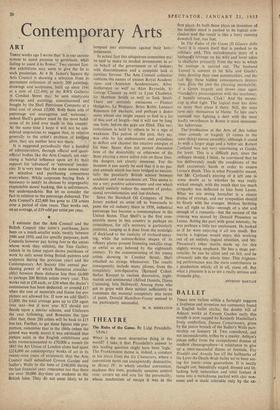THEATRE
The Rules of the Game. By Luigi Pirandello. (Arts.)
WHAT is the most destructive thing in the world? I take, it that Pirandello's answer to this leading question might have been 'logic.' The Frankenstein theme is, indeed, a constant in his plays from the Six Characters, where a convention turns out unexpectedly destructive, to Henry IV, in which another convention, madness this time, gradually assumes control over, covers up and acts for the personality, whose mechanism of escape it was in the
first place. In both these plays an invention of the human mind is pushed to its logical con- clusion and the result is like a lorry running downhill fast, too fast.
In The Rules of the Game (II Giuoco delle Parti) it is reason itself that is pushed to its nihilistic end. This melodramatic 'story of a husband's revenge on his wife and lover takes is character primarily from the way in which he revenge is carried out. The husband Leone) is content to let Silia and Guido's Mans develop their own potentialities, and the'
Pact that those hidden consequences destroy 'hem gives the pldt the pleasing inevitability if a Greek tragedy and shows once again Pirandello's preoccupation with the machinery if hunufn nemesis. Click! And the mouse- trap is shut tight. The logical man has done no more than place it there. Still, the mice have only themselves to blame. To lure one's husband into fighting a duel with the most Jeadly swordsman in Rome is most unmouse- 'ike behaviour.
The' production at the Arts of this 'rather iitter comedy or tragedy (it comes to the >arne thing) moves smoothly, although it could Jo with a larger stage and a better set. Robert Cartland was not very -convincing as Guido, the lover. This is a difficult part, since the audience should, I think, he convinced that he has deliberately made the conditions of the duel excessively harsh in order to ensure Leone's death. This is what Pirandello meant, but Mr. Cartland's playing of it left one in some doubt as to whether he was really wicked enough, with the result that too much sympathy was deflected to him from Leone. What we are seeing hereafter is a classic drama of revenge, and our sympathies should be firmly with the avenger. Melissa Stribling was all right as Silia—enough of a slut and enough of a romantic—but the success of the evening was scored by Donald Pleasence as Leone. Acting the part with great intensity, he was perhaps a little too unpleasant. He looked as if he were enjoying it all too much. But • maybe a logician would enjoy this working out of an entirely logical situation, and Mr. Pleasence's other merits made up for this slightly wrong emphasis. He has a stage per- sonality. he can be silent and yet felt, and he obviously acts the whole time. This frighten- ing performance was the main contribution to a production which, all in all, came off. But what a pleasure it is to see a really serious and dramatic play.
ANTHONY HARTLEY


































 Previous page
Previous page